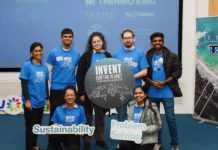A research team in Galway is taking part in a multinational study of how young people across Europe are experiencing the climate crisis.
Starting this month research teams from the UK, Ireland, Finland and Italy will be working with young people, teachers, educational institutions and youth groups on the project, to understand how youth experience and make sense of climate complexity.
Recent waves of climate activism have seen young people at the forefront of calls for greater action to combat climate change, including massive protest marches led by young people, and other activities such as school strikes.
The team at NUIG taking part in this study consists of Dr Gary Goggins, Professor Frances Fahy and Dr Kathy Reilly from the Discipline of Geography.
“It is vital that we listen to young people and include their voices in our ongoing efforts to tackle climate change,” Dr Goggins said.
“Young people are the future, but they are also important in the present. Understanding how young people experience this rapidly changing world, and their place in it, is central to developing effective solutions to the common challenges we face.”
The will enable young people to express how growing up in their particular contexts has helped to shape their worldview of the climate crisis, and develop recommendations on for teaching and learning in this area.
Policy recommendations will consider social, political, cultural and economic contexts in each region under study, and local, national and international recommendations will be put forward.
The project is funded by the JPI Climate SOLSTICE initiative for three years (2020-2023) with a total project budget of €1.38 million.
The funding organization for Ireland is the Environmental Protection Agency (EPA), who will provide €148,450 towards the overall budget.
Dr Jonathan Derham of the EPA said that the agency welcome’s NUIG’s success on this important research topic.
“The huge success of the 2019 Youth Assembly on Climate and the resulting media engagement demonstrated the need for more productive and enduring dialogue with young people.”












